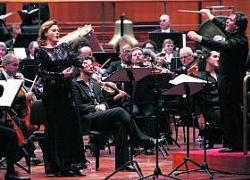|
|
|
|
|
|
|
|
| Giornale della musica |
| Luca Del Fra (translation by
Alexander Martin) |
Berlioz: La damnation de Faust, Accademia Nazionale di
Santa Cecilia, Rome, 21 October 2006
|
La damnation de Faust: concert or theatre?
|
| The symphony season at the Santa Cecilia was
inaugurated in the presence of leading exponents of the Italian Republic –
Napolitano, Rutelli, Veltroni, and councillors for regions and local bodies
– something that had not happened in years. |
|
 The
challenge at the opening of the symphony season of the Santa Cecilia was to
bring 'La damnation de Faust' back to its original concert form. Since the
end of the nineteenth century it has enjoyed a well-established tradition of
stagings, the best of which can probably be found in contemporary theatre,
which had a ball with Berlioz's rhapsodic narration. In this sense,
Pappano's approach is two-sided, with a decidedly symphonic atmosphere that
can be felt in the first two parts, a remarkable extension of tempos that
benefits the sinuous phrasing, sharp accelerations with moments of
directorial virtuosity such as during the Hungarian March, and dizzy
crescendos that create psychological tension. It has to be said that
Kaufmann was not particularly helpful in all of this. Although his dark
timbre would suit the Faust character well, it would appear that he had a
cold on this occasion. From the inn scene onwards it was more the theatrical
and instinctive dimension that got the upper hand, centring on Schrott's
particularly amiable and intriguing Mephistopheles; a charming Marguerite by
Kasarova provided the best moments of song. After four years, back under the
control of choirmaster Balatsch, the Choir of Santa Cecilia confirms its
class by creating an extraordinary difference between the voice of the
people, the inn, the demons, and of the celestial spirits sung by the treble
voices. Equally remarkable was the performance of the orchestra, with
spectacular viola and oboe solos. Pappano would appear to be the ideal
conductor for a pleasant evening of music that ends with the hope – and
without all the brouhaha currently surrounding the Festival of Cinema at
Rome's Auditorium – that he will return to the score to deliver the final
the coup de grace. The
challenge at the opening of the symphony season of the Santa Cecilia was to
bring 'La damnation de Faust' back to its original concert form. Since the
end of the nineteenth century it has enjoyed a well-established tradition of
stagings, the best of which can probably be found in contemporary theatre,
which had a ball with Berlioz's rhapsodic narration. In this sense,
Pappano's approach is two-sided, with a decidedly symphonic atmosphere that
can be felt in the first two parts, a remarkable extension of tempos that
benefits the sinuous phrasing, sharp accelerations with moments of
directorial virtuosity such as during the Hungarian March, and dizzy
crescendos that create psychological tension. It has to be said that
Kaufmann was not particularly helpful in all of this. Although his dark
timbre would suit the Faust character well, it would appear that he had a
cold on this occasion. From the inn scene onwards it was more the theatrical
and instinctive dimension that got the upper hand, centring on Schrott's
particularly amiable and intriguing Mephistopheles; a charming Marguerite by
Kasarova provided the best moments of song. After four years, back under the
control of choirmaster Balatsch, the Choir of Santa Cecilia confirms its
class by creating an extraordinary difference between the voice of the
people, the inn, the demons, and of the celestial spirits sung by the treble
voices. Equally remarkable was the performance of the orchestra, with
spectacular viola and oboe solos. Pappano would appear to be the ideal
conductor for a pleasant evening of music that ends with the hope – and
without all the brouhaha currently surrounding the Festival of Cinema at
Rome's Auditorium – that he will return to the score to deliver the final
the coup de grace. |
|
|
|
|
|
|
|
|
|
|
|
|
|
|
|
|
|
|